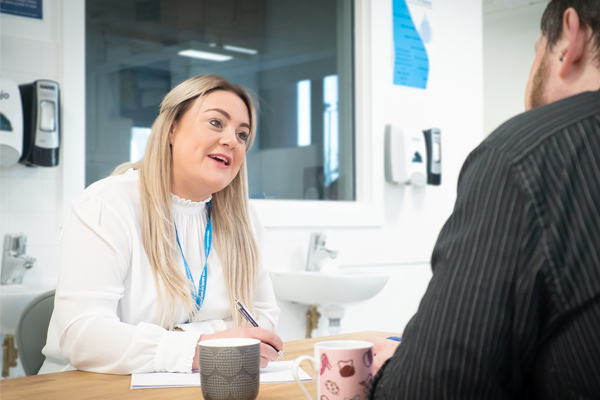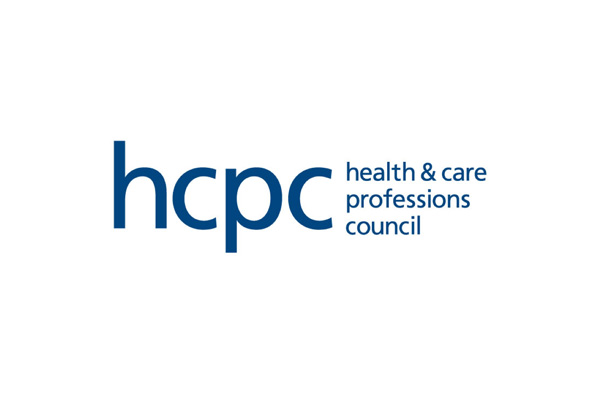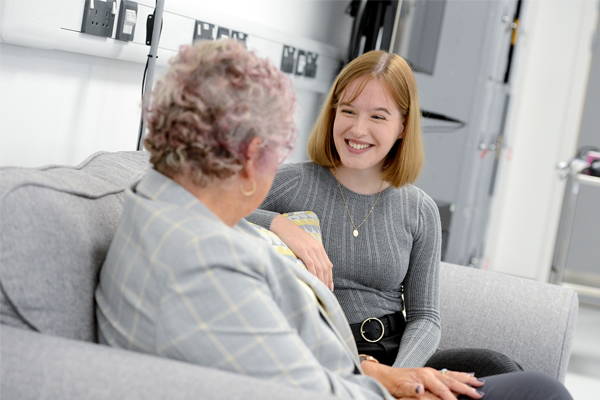Why Choose Lincoln
Opportunities for interprofessional working
Practice based learning
Opportunities for placements
Opportunities to engage with research centres

MSc Occupational Therapy (pre-registration) is a science-based programme designed to prepare graduates for work in a variety of settings, including health organisations, social care services, housing, education, voluntary organisations, or as independent practitioners.
This programme is suited to those who want to fulfil, or work towards fulfilling their potential as an occupational therapist, to promote function, quality of life, and the realisation of potential in people who are experiencing occupational deprivation, imbalance, or alienation. They believe that activity can be an effective medium for remediating dysfunction, facilitating adaptation, and recreating identity.
Occupational therapists work with adults and children of all ages with a wide range of conditions; most commonly those who have difficulties due to a mental health illness, or physical or learning disabilities. The course seeks to develop the skills, knowledge, and confidence needed to work in a range of complex and dynamic health and social care environments.
Students on this course are encouraged to appreciate and understand current occupational therapy practice, while being critical in their approach to developing new, innovative, and evidence-based interventions. There are interprofessional components of the course which are designed to develop practitioners who are professional, compassionate, safe, reflective, and autonomous. Working with peers from other professions including physiotherapy, nursing, midwifery, and social work helps promote team work, collaboration, and an application of research skills in the transformation of health and social care services.
Opportunities for interprofessional working
Practice based learning
Opportunities for placements
Opportunities to engage with research centres

The foundation of this course is the inter-professional learning approach to develop and promote a culture of wellness in health and social care. Students on this pre-registration MSc Occupational Therapy course can experience collaborative approaches to learning and teaching that will challenge traditional perceptions of healthcare provision.
A variety of learning and teaching strategies will be used to cater for the individual needs of students on the programme. These strategies may include lectures, seminars, workshops, small group activity, self-assessment, case studies, library based resources, clinical skills sessions, virtual learning, simulation, and practice-based learning.
To find out more about occupational therapy, please visit the Royal College of Occupational Therapy website at: https://www.rcot.co.uk/ and http://bit.ly/octherapy
Contact Hours and Independent Study
Contact hours may vary for each year of your course. Students will be engaged in a two-year full-time course and so, at the very least, should expect to undertake a minimum of 37 hours of study each week during term-time. There may also be assignments set outside of term time. The composition and delivery of the course varies for each module. Each year of the course runs from January to January.
Master's level study involves a significant proportion of independent study, exploring the material covered in lectures, seminars and practice-based learning. As a general guide, for every hour spent in class, students are expected to spend two to three hours in independent study.
This course is accredited by the Health and Care Professions Council (HCPC) and the Royal College of Occupational Therapists (RCOT). Successful completion of this programme will provide graduates with the eligibility to apply to the HCPC Register as an occupational therapist and membership of the Royal College of Occupational Therapists.

† Some courses may offer optional modules. The availability of optional modules may vary from year to year and will be subject to minimum student numbers being achieved. This means that the availability of specific optional modules cannot be guaranteed. Optional module selection may also be affected by staff availability.
We want you to have all the information you need to make an informed decision on where and what you want to study. In addition to the information provided on this course page, our What You Need to Know page offers explanations on key topics including programme validation/revalidation, additional costs, contact hours, and our return to face-to-face teaching.
In addition to academic-based learning in a modern university setting students will be required to complete over 1,000 hours of practice-based learning over four placements in a variety of clinical settings.
In the second year, students have the opportunity to develop a ‘role emerging placement’ to explore an area where occupational therapists haven’t traditionally worked before, subject to achieving the minimum requirements for supported practice learning. This is an excellent opportunity to contextualise your learning, and further understand the role of an occupation therapist in a real-world setting.
You are responsible for your own travel, accommodation, and general living costs relating to placements, but some NHS funding may be available.
Students will be assessed both formally and informally throughout the course to develop their learning and autonomy. The assessments will take place both within the University and practice placement environments. Practice-based learning will be pass/fail, while the Level 7 academic work will contribute towards a student's final grade.
Some of the assessment will be led by tutors but students are also encouraged to engage in peer and self-assessment to help develop the skills of reflection and evaluation which are essential for lifelong learning and continued professional development following registration as an Occupational Therapist.
Some of the assessments will focus on theoretical knowledge and application of theory, and others on the practical performance of technical skills and patient management. Detailed guidance of what is expected, and the assessment criteria, will be provided for each module.
Assessment Feedback
The University of Lincoln's policy on assessment feedback aims to ensure that academics will return in-course assessments to students promptly - usually within 15 working days of the submission date (unless stated differently above).
Methods of Assessment
Assessment methods on this course will vary for each module. It could include coursework, such as a service transformation project, written and practical exams, and demonstrations, group work or presentations. You will also be assessed in clinical practice on your four placement blocks.
The University of Lincoln is home to the Community and Health Research Unit (CaHRU), which is the research centre for the School of Health and Social Care. CaHRU conducts world-leading interdisciplinary research with service users, health service professionals, and organisations to increase health and wellbeing across the health, social, and third sector care services. CaHRU is allied with the Lincoln Institute for Health.
Explore Research
Many registered Occupational Therapists work within the NHS or in social care settings and are recruited and employed by individual organisations. This forward-looking programme appreciates that many occupational therapists and new graduates may also work in non-traditional OT roles, or for private and third sector organisations.
New, varied, and innovative job opportunities are increasingly available to qualified Occupational Therapists, and this programme aims to prepare its graduates accordingly. Non-clinical careers also exist in teaching, research, management and administration, health and safety, and training and development. The experienced teaching team can help students explore and develop their individual career aspirations.
Postgraduate Application Support
Applying for a postgraduate programme at Lincoln is easy. Find out more about the application process and what you'll need to complete on our How to Apply page. Here, you'll also be able to find out more about the entry requirements we accept and how to contact us for dedicated support during the process.
How to Apply
- Applicants should hold an honours degree in a relevant discipline at 2:2 classification or above. If you are unsure whether your first degree is relevant we welcome you to send us your degree transcript so that our Admissions Tutor can advise you further.
- Entry on to the course is subject to meeting the requirements of a profession specific occupational health screening.
Certificates and degree transcripts of all previous qualifications will need to be provided before any offers are confirmed.
International Applicants
We welcome international applications although our places are very limited.
All international applicants require IELTS 7.0 with a minimum of 6.5 in each element for students whose first language is not English. Applicants must provide a valid IELTS certificate at the point of application.
Students who have completed a UK degree within 5 years of their proposed enrolment at the University will not be required to provide IELTS.
For information regarding other English language qualifications we accept, please visit the English Requirements page:
International applicants need to obtain a recent criminal record certificate from their home country and ensure this is still valid by the date of enrolment in addition to the DBS requirements detailed below. A list of admissible certificates can be found on the UK Government website; please see:
https://www.gov.uk/government/publications/criminal-records-checks-for-overseas-applicants.
Other requirements include:
- Evidence of recent academic learning
- Successful performance at an interview
- Knowledge of contemporary health and social care issues, and the role of the occupational therapist in providing health and social care interventions
- Understanding of written material and can communicate clearly and accurately in written and spoken English.
- All students will be required to sign the subject-specific Fitness to Practice Code of Conduct on entry, details of which will be forwarded with an offer letter
- Satisfactory completion of an Enhanced Disclosure from the Disclosure and Barring Service (DBS), including a check of all cautions and warnings as well as convictions before their place on the course is confirmed. Note that the University will pay the costs of this check directly on your behalf.
Applicants with disabilities:
We take seriously our obligation to make reasonable adjustments to ensure that all students with disabilities can successfully complete their studies. All applicants will be assessed based on the criteria outlined here regardless of any disability. If you declare a disability we will invite you to work with us to explore how best we can support your studies.
Other information:
You must declare all spent and unspent criminal convictions including (but not limited to) cautions, reprimands, final warnings, bind over orders or similar and details of any minor offences, fixed penalty notices, penalty notices for disorder, ASBOs or VOOs.
Further information can be found at https://www.gov.uk/government/organisations/disclosure-and-barring-service.
If you would like further information about entry requirements or would like to discuss whether the qualifications you are currently studying are acceptable, please contact the admissions team on 01522 886097, or email admissions@lincoln.ac.uk.
You will need to have funding in place for your studies before you arrive at the University. Our fees vary depending on the course, mode of study, and whether you are a UK or international student. You can view the breakdown of fees for this programme below.
The University offers a range of merit-based, subject-specific, and country-focused scholarships for UK and international students. To help support students from outside of the UK, we offer a number of international scholarships which range from £1,000 up to the value of 50 per cent of tuition fees. For full details and information about eligibility, visit our scholarships and bursaries pages.
From September 2023, pre-registration undergraduate and postgraduate healthcare students can apply for the NHS Learning Support Fund (LSF).
If eligible, you will receive:
- A training grant of £5,000 GBP per academic year.
- Increased parental support of £2,000 GBP, if you have at least one dependent child under 15 years, or under 17 years if registered with special educational needs.
- Increased money back for excess travel and temporary accommodation costs (Travel and Dual Accommodation Expenses) while you're on your practice placement.
- Students experiencing financial hardship (Exceptional Support Fund).
For more information and to see your eligibility, visit: https://www.nhsbsa.nhs.uk/nhs-learning-support-fund-lsf
Please note, this government bursary is available to Home students only. Details on scholarships and bursaries available to Overseas and EU students can be found online: https://www.lincoln.ac.uk/studywithus/scholarshipsandbursaries/
Please note that International students will not be eligible for support for travel and accommodation.
Students are responsible for their own travel, accommodation, and general living costs relating to placements.
Placement expenses for travel, and accommodation may be reimbursed by NHS Bursaries where, for example, the requirement exceeds that of attending university; requires transport out of normal operating hours; or requires additional accommodation to that of the usual term time location. These expenses may need to be covered initially by the student before any applicable reimbursement is received.
The current rates for reimbursement can be found here: https://www.nhsbsa.nhs.uk/nhs-learning-support-fund-lsf/travel-and-dual-accommodation-expenses
You may find that there are additional costs. These may be with regard to the specific clothing, materials or equipment required, depending on your course.
With regards to text books, the University provides students who enrol with a comprehensive reading list and you will find that our extensive library holds either material or virtual versions of the core texts that you are required to read. However, you may prefer to purchase some of these for yourself and you will be responsible for this cost.
Postgraduate Funding Options
Find out more about the optional available to support your postgraduate study, from Master's Loans to scholarship opportunities. You can also find out more about how to pay your fees and access support from our helpful advisors.
Explore Funding Options
For more information about this course, please contact the Programme Leader.
Dr Louise Howe
To get a real feel for what it is like to study at the University of Lincoln, we hold a number of dedicated postgraduate events and activities throughout the year for you to take part in.
Upcoming Postgraduate Events